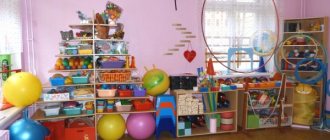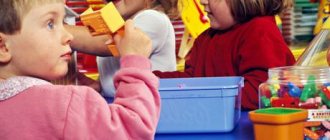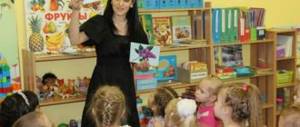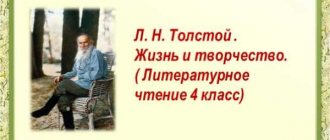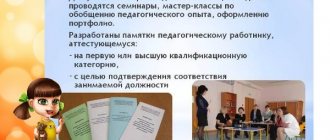"Summer in kindergarten." Organization of summer recreational work in preschool educational institutions presentation on the topic
Slide 1
State budgetary educational institution of the city of Moscow Lyceum No. 1571 Summer in kindergarten ORGANIZATION OF SUMMER HEALTHCARE WORK IN A DECREE Moscow
Slide 2
Hello summer! So much sun! How much light! So much greenery all around! What is this? This SUMMER is finally rushing into our house. Songbirds are discordant! The fresh smell of juicy herbs, ripe ears of corn in the field and mushrooms in the shade of oak forests. (T. Bokova)
Slide 3
Summer is an amazing and fertile time when children can walk, run and jump to their heart's content. It is during this period that they spend a lot of time outdoors. Preschoolers' stay in the fresh air in the summer strengthens and hardens the child's body and has a positive effect on their all-round development.
Slide 4
The main task of adults is to satisfy as fully as possible the growing body’s need for rest, creative activity and movement. A clearly planned system of entertainment, educational and health-improving activities will help ensure the necessary level of physical and mental development of children.
Slide 5
Objectives of summer health work in educational areas: 1. Physical development 2. Artistic and aesthetic development 3. Cognitive and speech development 4. Social and communicative development
Slide 6
“Physical development” Strengthen children’s health by increasing the body’s adaptive capabilities, develop motor and mental abilities, and contribute to the formation of a positive emotional state. Comprehensively improve the physical functions of the body. Increase the performance of the child’s body through various forms of hardening. Generate interest and need for physical exercise. Satisfy the natural need for movement, create conditions for demonstrating the motor skills of each child. Contribute to the prevention of morbidity and childhood injuries.
Slide 7
Artistic and aesthetic development Consolidate and deepen the musical impressions received throughout the year. Support children's initiative in improvisation. Activate the child’s imagination, initiative, and creativity. To develop the foundations of musical and theatrical culture, to spiritually enrich children with positive emotions. To improve children’s performing skills in creating an artistic image, using game, song and dance improvisations for this purpose.
Slide 8
Develop communication skills in various communication situations: with peers, teachers, parents and other people. Involve children in observing reality, develop the ability to see the world through the eyes of a creator-artist. Provide freedom to reflect - using artistic means accessible to the child - their vision of the world. Develop the ability to convey mood, state, attitude towards what is depicted, experiment with different types and methods of depiction. Create maximum freedom to take initiative and the physical and psychological space necessary for this.
Slide 9
Cognitive and speech development Satisfy children's curiosity without suppressing interest in recognizing nature, form ideas about it necessary for the child's comprehensive development, instill skills of activity and independent thinking. Develop communication skills with peers, adults and the environment with a focus on non-violent behavior. Provide ample opportunities to use all five senses: see, hear, touch, taste, feel various elements of the surrounding world.
Slide 10
Social and communicative development Develop the play activities of pupils. Familiarization with basic generally accepted norms of relationships with peers and adults. Continue work on the formation of gender, family, citizenship, and patriotic feelings. Develop work activity, cultivate a value-based attitude towards one’s own work, the work of other people, and its results. To form an idea of situations that are dangerous for humans and the natural world and ways of behavior in them.
Slide 11
Regulating normative documents Convention on the Rights of the Child (approved by the UN General Assembly on November 20, 1989); Constitution of the Russian Federation of December 12, 1993 (Articles 38, 41, 42, 43); Federal State Educational Standard for Preschool Education dated October 17, 2013. Order of the Ministry of Education and Science of the Russian Federation dated October 27, 2011 No. 2562 “On approval of the Model Regulations on a Preschool Educational Institution”; Order of the Ministry of Health of Russia dated 04.04.03 N 139 “On approval of instructions for the introduction of health technologies in the activities of educational institutions; Sanitary and epidemiological requirements for the design, content and organization of the operating mode of a preschool educational institution. Sanitary and epidemiological rules and standards SanPiN 2.4.1.3049-13 Instructions for protecting the life and health of children in preschool institutions and playgrounds, approved by the Ministry of Education of the RSFSR on January 30, 1955; “From birth to school” edited by N. E. Veraksa, M. A. Vasilyeva; T. S. Komarova; V. V. Gerbova.
Slide 12
Principles of planning health-improving work; integrated use of preventive, hardening and health-improving technologies; continuous implementation of preventive, hardening and health-improving measures; predominant use of non-drug recovery; increasing the effectiveness of the system of preventive and health measures through compliance with basic rules and regulations: optimal motor mode, physical activity, sanitary condition of the institution, catering, air-thermal conditions and water supply.
Slide 13
Forms of recreational activities in the summer. 1. Organized educational activities.
Slide 14
Forms of recreational activities in the summer. 2. Morning exercises.
Slide 15
Forms of recreational activities in the summer. 3. Outdoor games.
Slide 16
Forms of recreational activities in the summer. 4. Motor warm-ups
Slide 17
Forms of recreational activities in the summer. 5. Elements of sports, sports exercises.
Slide 18
Forms of recreational activities in the summer. 6. Awakening gymnastics. Exercising after a nap.
Slide 19
Forms of recreational activities in the summer. 7. Individual work during the day 8. Hardening activities.
Slide 20
Planning work during the summer recreational period with children
Slide 21
Long-term thematic planning The basis for choosing topics is the children's perception of the world around them WEEK M E S I C JUNE JULY AUGUST 1 Solar Water Air 2 Flower Forest Zoological 3 Vitamin Soil Reserve 4 Hiking Tourist Cruise
Slide 22
Day of the week Idea of the day Monday Inquisitive introduces the topic of the week, together with the children determines the range of interests, designs subsequent activities Tuesday Hardworker begins to implement the idea through manual labor, work in nature, creative activity and design Environment Mikrosha observes, experiments, encourages children to discover new knowledge , ways of learning Thursday Zdorovinka activates, introduces to a healthy lifestyle through relay races, competitions, outdoor games Friday Chudinka no “obligations”, it is important to “infect” children, parents, teachers with a positive attitude towards the “events of the week”, to realize the importance of a joint holiday
Slide 24
JUNE “Child at home” Cognitive – speech and social-personal development Week I Week II – Conversation with looking at pictures “In the world of dangerous objects and devices” – Conversation “Service “01” – Learning proverbs, sayings, riddles – Playing “with a magnet” – Reading: “The Story of an Unknown Hero”, “About Kuzma”, “Baby Elephant – Fireman”, “Our Number 01”, “Cat’s House”. — Work in the garden — Conversation “Me and my family” — Composing a story “I’m visiting my grandmother” — Game “visiting” (about the rules of etiquette) — Finger gymnastics “Our apartment” — Conversation “Hurray, guests” — Conversation about Russian names - Looking at family albums - Table manners - Reading Shorygin's "Polite Fairy Tales" - Conversation "On how to behave with parents" - Work in the garden
Slide 25
Artistic and aesthetic development - Making "Danger" signs - Modeling "Cutlery" - Orientation in space "My room" - Making personal notebooks "Road Safety" - Magic paper strips "Traffic Light" - Listening to music about pets - Playing exercise "Terrible Beast" - Puppet theater "Cat House" - Accordion applique "We'll hold hands" - Drawing "My family" - Modeling "Cake for Grandma" - Thread applique "Bouquet for Mom" - Making d/i "Serving" table" - Musical and sports festival "Children's Day" - Entertainment "Friendly Family" - Listening to "Mother's caresses" music. Grechaninova, “Nanny’s Tale” Tchaikovsky - Song-song “Lullaby” - Song “Grandmothers” - Fun game “Girls and Boys”
Slide 26
Physical development - Breathing exercises "Firemen", - Entertainment "Firemen" - P/i: "Cossacks-robbers", "Firemen in exercises", "Hide and seek with the house", "Two fires" - Game exercise "Telephone" - Sports game “Football” - Leisure “To grandma’s yard” - Entertainment “Mom, dad, I’m a friendly family” - P/n: “I know”, “It’s time for grandma to have a feast”, “Hello neighbor”, “Grandfather’s horn”, “Give grandpa a pen,” — Plot game “Cars and Pedestrians”
Slide 27
Events Group Responsible June Holiday dedicated to Children's Day “Let's give the globe to the children!” Preparatory, senior Music director, teachers “Hello, red summer!” Middle, junior Music director, teachers Entertainment “Guess the melody!” Preparatory, senior Musical director Puppet theater “About how Alenka herded the gosling” Secondary, junior Musical director Yard Games Festival Preparatory, senior, middle Physical education instructor “Summer Concert” All groups Musical director Competition “Young Artists” (painting on asphalt ) Preparatory, senior, secondary Arts teacher Knight's tournament Preparatory, senior Physical education instructor Musical and sports festival “Our Motherland is Russia!” Preparatory, senior, secondary Music director, physical education instructor Day of the Good Wizards Preparatory, senior Educators
Slide 28
Days of the week Events Responsible Wednesday (June 9 – International Friends Day) Conversations: “What is a friend”, “What are friends for” Attraction “Give a smile to a friend” Reading fiction: “Teremok” by Ushinsky, “Toys” by A. Barto, “Song of Friends” by S. Mikhalkov, “The Three Little Pigs” translated by S. Mikhalkov, “Musicians of Bremen” by Grimm, “Childhood Friend” by V. Dragunsky, “Flower – Seven Flowers” by V. Kataev, “Bobik Visiting Barbos” N. Nosov Making a gift for a friend Drawing a portrait of a friend P/i: “Hopscotch”, “Jump ropes”, “Mousetrap”, “Traps”, “carousels” Group teachers Thursday (June 10 – day of the clock) Conversations: “About time”, “ If there were no clocks”, “What do we know about clocks” Examination of illustrations depicting different types of clocks; parts of the day; calendars Reading fiction Exhibition of watches - with the participation of parents Drawing competition “Fairy clocks” D/i: “When it happens”, “Choose a pattern for a clock” P/i: “If you drive more quietly, you will go further”, “Day - night”, “Memories” - with a ball S/r game: “School” Group teachers
Slide 29
Memo for educators on work during the summer recreational period. Plan the educational process based on the comprehensive thematic principle of planning and integration of educational areas. Track information in the Notebook of information about parents (+ new arrivals). Study the health sheets of children admitted from other groups and kindergartens. Keep a notebook of early child care signed by parents (or statements from parents). Keep a filter log (for early age groups). Every day before children go for a walk, check the safety of the playground, sandbox, and small forms; Immediately report violations to the duty administrator. Every day he receives children and does morning exercises outside.
Slide 30
Carry out hardening procedures in everyday life. Keep track of the number of towels for hands and feet, markings of bed linen, combs, and furniture. Stay hydrated while walking. Takeaway material for a walk. The outgoing material is checked for serviceability and safety, washed daily after each walk and placed in baskets. Make sure all the toys are collected. Every day after walks, verandas and houses are swept. On hot days, the site area is irrigated with water. The sand in the sandboxes is loosened daily, spilled with water, and covered with a cover after a walk.
Slide 31
Contents of the walk: observations, work on the site and in the garden, visual arts, design, experiments, reading, role-playing games, theatrical, directing, didactic games, outdoor and sports games, excursions along ecological paths, individual work. When organizing summer activities, practice subgroup and individual work. Activities related to physical activity (outdoor games, physical education, excursions, work) should be carried out in the hours before the onset of heat or after its subsidence. During the day, alternate phases of active and moderate activity for children. Inform parents about the regime in kindergarten and at home, hardening, nutrition, organizing active recreation on weekends, the use of sports equipment in the physical development of children, the safety of children on the streets of the city, in the country, at the reservoir.
Slide 32
References Belaya, K.Yu., Sotnikova, V.M. Colorful games [Text] / K.Yu. Belaya, V.M. Sotnikova. – M.: Linka-press, 2007. – 336 p. Doronova, T.N. Adults and children play: from the experience of preschool educational institutions in Russia [Text] / T.N. Doronova – M.: Linka-press, 2006. – 208 p. Penkova, L.A. Under sail Summer sails across the Earth [Text]: a methodological manual for workers of preschool institutions, students of pedagogical universities and colleges / L.A. Penkova. – M.: Linka-press, 2006. – 288 p. FROM BIRTH TO SCHOOL. Basic general education program for preschool education / Ed. N. E. Veraksy, T. S. Komarova, M. A. Vasilyeva. - M.: MOSAIKA-SYNTHESIS, 2010. - 304 p.
Slide 33
THANK YOU!
MAGAZINE Preschooler.RF
Presentation “How we spent our summer”Author: teacher Smolanova Maria Valerievna
Summer is a favorable period for preschoolers to improve their health. You can spend more time in the air, play, strengthen yourself and enjoy: fresh air, sun rays and warm, gentle water. In the kindergarten, in the younger group “Kapelki”, summer health work was carried out.
We have set ourselves the following tasks for summer health work:
Create conditions that ensure the protection of the life and health of children, the prevention of morbidity and injury.
Implement a system of measures aimed at the health and physical development of children, their moral education, the development of curiosity and cognitive activity, the formation of cultural, hygienic and labor skills.
Carry out pedagogical and health education of parents on the issues of education, health and safety of children in the summer.
The purpose of our work:
Creation of the most effective conditions in the group and at the kindergarten site for the organization of health-improving work and the development of cognitive abilities of pupils in the summer.
Work during the summer period was carried out in the following areas:
educational work,
health,
working with parents
The group developed a daily routine, according to the summer period: morning reception and exercises in the air, walks for at least 4 hours, hardening activities: sunbathing, dousing hands up to the elbows, increasing sleep time, vitamin supplementation and caloric intake, physical exercise, drinking regime was observed, The grass was mowed in a timely manner.
More time was devoted to outdoor play activities: outdoor games, story games of various themes, and didactic games. A lot of time was devoted to reading fiction: fairy tales, riddles, learning poetry.
Consultations have been prepared for parents:
“Types of play activities for children during the summer recreational period”;
- "Healthy family lifestyle"
- "Safe behavior near bodies of water"
- "Safe behavior on the roads".
Conversations were held with parents:
- “How to dress a child in the summer”.
- "Spare clothes and hat in summer".
- “What kind of shoes should be worn in kindergarten in the summer”.
Group registration
The teachers created a corner “Here it is, what our summer is like ,” where material about hardening, riddles, proverbs, and poems for memorizing with children about summer were placed. Also, the group’s interior was decorated with a summer theme.
Site design
In summer, nature provides rich opportunities for the development of cognitive abilities of preschoolers. Children come into contact with nature, learn about the world, and get vivid impressions. Taking this into account, we organized and carried out work with children, creating comfortable conditions for preschoolers to stay in the fresh air. The child’s activities on the street provide the opportunity to freely choose activities, alternating their types: games, entertainment and leisure activities.
By the beginning of the summer season, we made a rearrangement on the veranda: we brought out equipment for children to play in the fresh air: sports equipment (sandbags for throwing, balloons, gymnastic ribbons, balls, skittles, etc.), for story games (strollers, cars, table, chairs, dolls), for art activities (paper, pencils, wax crayons), for design (building material).
Together with my parents, I purchased sand sets, cars and much more.
Safety
To create safe conditions for children to stay in the preschool educational institution, the serviceability of the equipment on the exercise area was checked daily, and the area was inspected before the walk for the presence of objects dangerous to children (nails, broken glass, dug holes, sticks and branches, etc.). With the onset of the hot period, in order to avoid overheating, the pupils went for walks only in hats; preschoolers' exposure to direct rays of the sun alternated with games in the shade.
In order to organize a water and drinking regime, our group had individual mugs for children, a kettle, and chilled boiled water.
Health-saving technologies
The children spent most of their time outdoors. Gymnastics, play activities and other activities were organized in the fresh air. In the summer we played a lot of outdoor games with the children: “At the Bear in the Forest” , “Bear Hen and Chicks” , “Sparrows and the Cat” , “Shaggy Dog” , etc.
Vitaminization of dishes was carried out - an abundance of fruits and vegetables in the diet of pupils
In order to organize physical education and health work in the summer, children were hardened: air baths, washing.
The following hardening activities were regularly carried out: extensive washing of the face, hands up to the elbows, health running, gymnastics after sleep, walking along ribbed paths.
During special periods, the children were given finger exercises (card index), breathing exercises (card index), visual gymnastics (card index), and self-massage.
Ecological corner
Together with the children, we developed a small garden on the site: we planted lettuce, strawberries, onions, mint, lemon balm), as well as a flower bed with flowers and ornamental plants.
All summer, children watched the growth of plants, flowering, and fruit setting. They looked after the plants and watered them.
Holidays and events in summer
Children Protection Day
(Draw with crayons on the asphalt)
Holiday "Waltz of Flowers" , application "The most beautiful bouquet" .
Holiday "Show of Soap Bubbles"
Sports event: "Journey to the Land of Insects" .
Puppet show
"Not a hedgehog"
As a result of the work carried out, the incidence of children's illnesses decreased and the physical and mental condition of preschoolers improved. Children have become more active, friendly, inquisitive and sociable.
thank you for your attention
| Next > |
